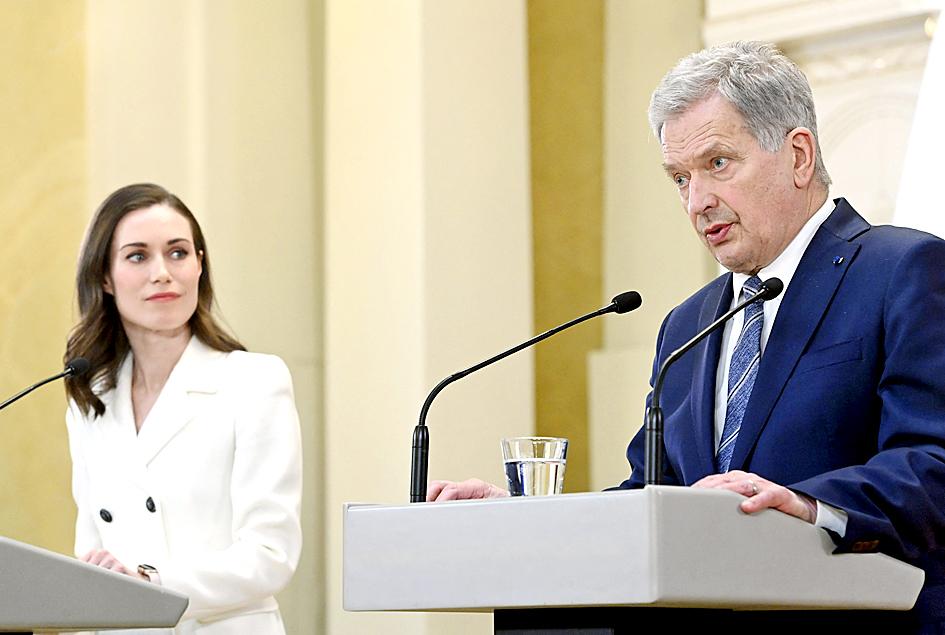The Finnish government yesterday officially announced its intention to join NATO, as Sweden’s ruling party was to hold a decisive meeting that could pave the way for a joint application.
Less than three months after Russia invaded Ukraine on Feb. 24, the move is a stunning reversal of Finland’s policy on military non-alignment dating back more than 75 years.
Sweden, which has been militarily non-aligned for more than two centuries, is expected to follow suit with a similar announcement, possibly today.

Photo: AFP
“Today, the president of the republic and the government’s Foreign Policy Committee have jointly agreed that Finland will apply for NATO membership, after consulting parliament,” Finnish President Sauli Niinisto told reporters at a joint news conference with Finnish Prime Minister Sanna Marin.
“This is a historic day. A new era is opening,” Niinisto said.
Despite last-minute objections by Turkey, NATO members are on “good track” in their discussions on welcoming Sweden and Finland into the Western military alliance, Croatian Minister of Foreign and European Affairs Gordan Grlic Radman said as he arrived for talks with NATO counterparts in Berlin.
Finland’s parliament is to convene to debate the membership proposal today.
“We hope the parliament will confirm the decision to apply for NATO membership during the coming days. It will be based on a strong mandate,” Marin said.
An overwhelming majority of Finnish lawmakers support the decision after Marin’s Social Democratic Party on Saturday said it was in favor of joining.
“Hopefully, we can send our applications next week together with Sweden,” Marin had said on Saturday.
The two Nordic countries broke their strict neutralities after the end of the Cold War by joining the EU and becoming partners to NATO in the 1990s, solidifying their affiliation with the West.
However, the concept of full NATO membership was a non-starter in the countries until the war in Ukraine saw support for joining the alliance soar.
Finland, which shares a 1,300km border with Russia, has been leading the charge, while Sweden appears anxious at being the only non-NATO country around the Baltic Sea.
Finland is also Sweden’s closest defense cooperation partner.
Many Swedish politicians have said their support is conditional on Finland joining.
On Saturday, Niinisto telephoned Russian President Vladimir Putin to inform him of his country’s desire to join NATO, in a conversation described as “direct and straightforward.”
“Avoiding tensions was considered important,” Niinisto said in a statement after the call.
However, Putin responded by saying that joining NATO “would be a mistake since there is no threat to Finland’s security,” the Kremlin said in astatement.
Moscow has repeatedly warned both countries of consequences if they join NATO.

A magnitude 7.0 earthquake struck off Yilan at 11:05pm yesterday, the Central Weather Administration (CWA) said. The epicenter was located at sea, about 32.3km east of Yilan County Hall, at a depth of 72.8km, CWA data showed There were no immediate reports of damage. The intensity of the quake, which gauges the actual effect of a seismic event, measured 4 in Yilan County area on Taiwan’s seven-tier intensity scale, the data showed. It measured 4 in other parts of eastern, northern and central Taiwan as well as Tainan, and 3 in Kaohsiung and Pingtung County, and 2 in Lienchiang and Penghu counties and 1

FOREIGN INTERFERENCE: Beijing would likely intensify public opinion warfare in next year’s local elections to prevent Lai from getting re-elected, the ‘Yomiuri Shimbun’ said Internal documents from a Chinese artificial intelligence (AI) company indicated that China has been using the technology to intervene in foreign elections, including propaganda targeting Taiwan’s local elections next year and presidential elections in 2028, a Japanese newspaper reported yesterday. The Institute of National Security of Vanderbilt University obtained nearly 400 pages of documents from GoLaxy, a company with ties to the Chinese government, and found evidence that it had apparently deployed sophisticated, AI-driven propaganda campaigns in Hong Kong and Taiwan to shape public opinion, the Yomiuri Shimbun reported. GoLaxy provides insights, situation analysis and public opinion-shaping technology by conducting network surveillance

‘POLITICAL GAME’: DPP lawmakers said the motion would not meet the legislative threshold needed, and accused the KMT and the TPP of trivializing the Constitution The Legislative Yuan yesterday approved a motion to initiate impeachment proceedings against President William Lai (賴清德), saying he had undermined Taiwan’s constitutional order and democracy. The motion was approved 61-50 by lawmakers from the main opposition Chinese Nationalist Party (KMT) and the smaller Taiwan People’s Party (TPP), who together hold a legislative majority. Under the motion, a roll call vote for impeachment would be held on May 19 next year, after various hearings are held and Lai is given the chance to defend himself. The move came after Lai on Monday last week did not promulgate an amendment passed by the legislature that

Taiwan is gearing up to celebrate the New Year at events across the country, headlined by the annual countdown and Taipei 101 fireworks display at midnight. Many of the events are to be livesteamed online. See below for lineups and links: Taipei Taipei’s New Year’s Party 2026 is to begin at 7pm and run until 1am, with the theme “Sailing to the Future.” South Korean girl group KARA is headlining the concert at Taipei City Hall Plaza, with additional performances by Amber An (安心亞), Nick Chou (周湯豪), hip-hop trio Nine One One (玖壹壹), Bii (畢書盡), girl group Genblue (幻藍小熊) and more. The festivities are to